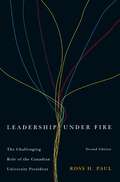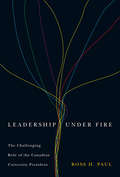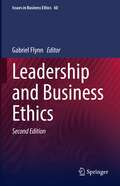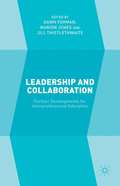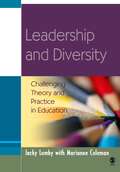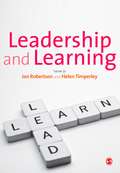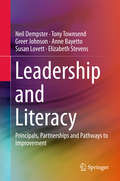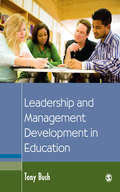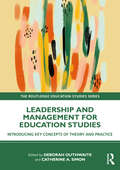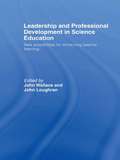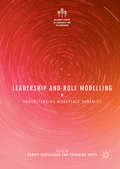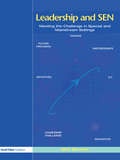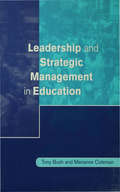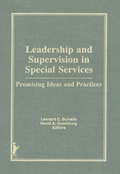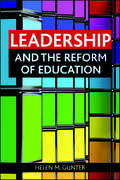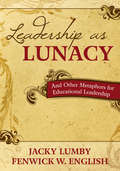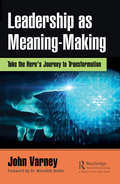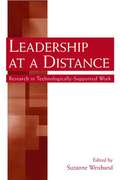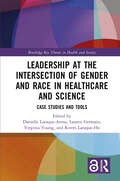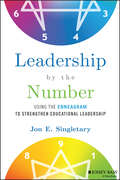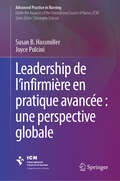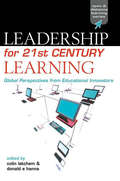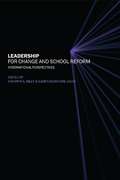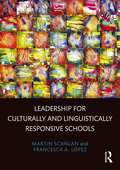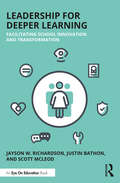- Table View
- List View
Leadership Under Fire, Second Edition: The Challenging Role of the Canadian University President
by Ross PaulAn insightful commentary on the leadership challenges faced by university presidents and a comprehensive survey of the changing university landscape.
Leadership Under Fire: The Challenging Role of the Canadian University President
by Ross H. PaulPaul illuminates some of the ways in which Canadian universities are unique and uses these differences to make clear the importance of organizational cultural and institutional fit for leaders confronting critical academic issues such as academic leadership and accountability, student success and support, university funding and fund-raising, strategic planning, government and community relations, and internationalism. His analysis reaffirms some long-standing practices, while arguing that changes are badly needed in others. While much has been written about university leadership elsewhere, Leadership Under Fire focuses on Canada and some of the men and women who have made a real difference to the quality of its post-secondary institutions. Paul builds on their stories to offer useful perspectives and advice at a time when the quality of universities was never more critical to the country's economic, social, and political success.
Leadership and Business Ethics (Issues in Business Ethics #60)
by Gabriel FlynnThis book offers new and challenging approaches to business ethics that successfully link theory and practice thereby overcoming lacunae and inadequacies in much of the literature concerning ethics and governance, a theme that recurs with remarkable frequency in the history of business ethics as an academic discipline. This work provides imaginative and innovate proposals for the indispensable coupling of virtue, integrity, and character with global business, finance, and banking. The volume seeks to overcome the marginal status of business ethics in universities, business, and enterprise by demonstrating that virtue ethics is an important step in the direction of an adequate response to the leadership issue. This new edition of a popular work points to new ways of achieving an ever more urgent coalescence of ethics and business. It proposes practical advice and viable suggestions to business people on what is right and wrong in business. The volume makes a vital contribution in the area of education that should serve the ongoing development of top leaders. In the important domain of women in leadership, the volume provides new solutions that break boundaries on the global stage. The work challenges unethical marketing of human images with important implications for citizenship and society. The volume contains creative suggestions for the use of spirituality and human development for the enhancement of business and society. The significantly extended second edition includes an exciting line up of leading academics and practitioners in the audacious hope that something may change for the better in the realms of business and banking.
Leadership and Collaboration
by Marion Jones Jill Thistlethwaite Dawn FormanLeadership and Collaboration provides international examples of how leadership of interprofessional education and practice has developed in various countries and examines how interprofessional education and collaborative practice can make a difference to the care of the patient, client and community. The authors showcase a variety of contexts in which interprofessional education and practice is now taking place and provide guidance for leaders to establish and maintain an environment where everyone involved in the team can 'learn with, from and about each other to improve collaboration and the quality of care".
Leadership and Diversity: Challenging Theory and Practice in Education (Education Leadership for Social Justice)
by Professor Jacky Lumby Marianne ColemanWhat do we mean by diversity? Why is it an important issue for leaders of schools, colleges and universities? As society becomes increasingly diverse, there is significant international awareness in education about how this impacts on leaders and leadership. For decades the emphasis has been placed on increasing the number of leaders with specific attributes, such as women or those from ethnic minorities, to encourage a true representation of society. This far-reaching book takes a wider view, challenging the reader to recognise the importance of diversity issues and to embed diversity as central within leadership theory and practice. Drawing on their extensive research the authors establish a clear understanding of what diversity means and use this to develop a distinct approach to conceiving leadership, preparing leaders and acting as leaders. They explain how diversity should be a holistic issue which touches every aspect of leadership and is vital to ensuring effective and appropriate leadership for education in pluralist societies. The authors explore the history of approaches to addressing inequities in access to leadership positions and the experience of leadership, from equal opportunities, to diversity and inclusion, to capabilities approaches. The book also proposes fundamental and concrete changes that leaders can undertake both in their own and their organisation's practice, to reflect a real commitment to social justice in a diverse society.
Leadership and Learning
by Jan Robertson Helen TimperleyBringing together internationally recognised scholars this book focuses on the relationship between leadership and learning for the education community. It draws together a wealth of knowledge and research in the field across a variety of contexts, such as system leadership, professional learning communities and leading different cultures. Themes covered include: - exploring models for leadership and improvement - challenges in developing learning-focused leadership - broadening ideas of learning and knowledge work. This book will be of interest to educational leaders at all levels and in all sectors, as well as consultants, academics and those who wish to extend their knowledge in educational leadership whether engaging in further academic study or in reflective practice around the ideas presented. This book is essential for anyone taking advanced programmes in educational leadership and management.
Leadership and Literacy
by Elizabeth Stevens Greer Johnson Neil Dempster Tony Townsend Anne Bayetto Susan LovettThis book focuses on what school leaders need to know and understand about leadership for learning, and for learning to read in particular. It brings together theory, research and practice on leadership for literacy. The book reports on the findings from six studies that followed school principals from their involvement in a professional learning program consisting of five modules on leadership and the teaching of reading, to implementation action in their schools. It describes how they applied a range of strategies to create leadership partnerships with their teachers, pursuing eight related dimensions from a Leadership for Learning framework or blueprint. The early chapters of the book feature the use of practical tools as a focus for leadership activity. These chapters consider, for example, how principals and teachers can develop deeper understandings of their schools' contexts; how professional discussions can be conducted with a process called 'disciplined dialogue'; and how principals might encourage approaches to shared leadership with their teachers. The overall findings presented in this book emphasise five positive positions on leadership for learning to read: the importance of an agreed moral purpose; sharing leadership for improvement; understanding what learning to read involves; implementing and evaluating reading interventions; and recognising the need for support for leaders' learning on-the-job.
Leadership and Management Development in Education (Education Leadership for Social Justice)
by Tony Bush'This is a very good and much needed book. Written by a very experienced researcher and teacher in the education leadership world it brings together a wealth of understanding and insights in the field of leadership and management development in education' - International Journal of Educational Management '[T]his book is an excellent survey of practice on a truly international scale which many will find valuable' - Educational Management Administration and Leadership 'Few people could be better qualified to write about this topic than Tony Bush. The book draws on a wealth of experience and detailed research. Typically, it is extremely well structured, written with great clarity, and combines the highest levels of scholarship with an accessible style that will enable it to appeal to a wide audience. This is a book that many in the field have been waiting for' - Professor Mark Brundrett, Professor of Educational Research, Liverpool John Moores University, Liverpool 'This book is far and away the best international comparative study of leadership development for schools. There are countless books highlighting the importance of leadership but none have satisfactorily gone to the heart of the issue, especially for developed and developing countries, and Tony Bush has done it here. It is a sure guide to policymakers, practitioners and researchers who want to make a difference' - Professor Brian J. Caldwell, Managing Director of Educational Transformations and former Dean of Education at the University of Melbourne, Australia Leadership is critical to educational development and specific preparation is vital if leaders are to maximise their effectiveness. In this major new text, Tony Bush draws on his extensive international experience and research to examine the case for leadership development and assess the different modes of preparation used in Europe, including the U.K., North America, Asia Pacific, Australia, New Zealand and Africa. He also examines research on how leadership impacts on school and student outcomes and considers future directions for leadership and management development in education. This text is essential reading for students of educational leadership and management as well as for policy-makers, headteachers and principals.
Leadership and Management for Education Studies: Introducing Key Concepts of Theory and Practice (The Routledge Education Studies Series)
by Catherine A. Simon Deborah OuthwaiteThis book introduces theories of educational leadership and management and provides examples of their translation into practice. Many students studying education no longer go directly into teaching, but instead follow a diverse range of careers associated with the education sector more widely: local authorities, think tanks, charities, school trusts, administrative, and managerial roles. This book highlights and explores these diverse pathways. For staff in schools who are currently on a National Professional Qualification (NPQ) this book gives an overview of differing leadership pathways, including senior leadership (NPQSL) and headship (NPQH), whilst also discussing the impact of system reforms (NPQEL). Topics covered include: strategies for leadership across primary, secondary, and higher education settings; school leadership and management through the challenges of the pandemic and beyond; equality and diversity and inclusive practice; non-teaching leadership roles. By offering an introduction to leadership and management discourse not usually encountered until postgraduate study, this lively and accessible book is an essential read for all students of Education Studies as well as those embarking on CPD or National Professional Qualifications.
Leadership and Professional Development in Science Education: New Possibilities for Enhancing Teacher Learning
by John Wallace John LoughranLeadership and Professional Development in Science Education provides invaluable insight into the role of science teachers as learners and thinkers of change processes. The fourteen chapters, by an eminent international team of science educators, explain and explore the relationship between professional development, teacher leadership and teacher learning. Research-based practical and theoretical exemplars reflect state of the art science teacher leadership in a broad range of international contexts.The book is divided into three parts, reflecting a multi-layered approach to teacher learning:* Personal initiatives in teacher learning, focusing on individual teachers;* Collegial initiatives in teacher learning, focusing on groups of teachers;* Systemic initiatives for teacher learning, focusing on system-wide issues.Student teachers and practising teachers will find the text highly valuable as they consider and review the challenges of teaching practice and ways of working with colleagues, while school leaders and policymakers will benefit from the book's insight into system-wide issues of professional development.
Leadership and Role Modelling: Understanding Workplace Dynamics (Palgrave Studies In Leadership And Followership Ser.)
by Shruti Vidyasagar Poornima HattiThis edited volume explores the influence of role modelling as a process in the workplace; in particular, whether it can aid career development, offer psycho-social support, and provide the motivation and means to achieve goals. Chapters examine whether the dynamics of personal identification and self-belief can affect the way that role models are chosen, placing emphasis on geographical diversity and cultural aspects. By including studies of gender and followership in both American and Indian settings, the scholars and practitioners who contribute to this collection outline key aspects of role modelling, and its effect as a developmental tool in the workplace, from the perspective of the individual and organisations. This book is a valuable resource for academics interested in organisations, management, and diversity, as well as practitioners and policy-makers involved in leadership programmes, who will find its collection of both theoretical and empirical findings extremely useful.
Leadership and SEN: Meeting the Challenge in Special and Mainstream Settings
by BurnettHow can leaders turn their schools into outward looking centres of excellence? Answering that question, this book focuses upon the work of cutting edge leaders who are responding to the challenges of recent legislation and guidelines. It includes: thoughtful case studies examine school culture, restructuring and reorganization mind maps and chapter summaries to help readers get on top of crucial issues and ideas helpful pointers on how to avoid pitfalls and maximise successes. For special school leaders and prospective leaders, those involved in making decisions about specialist provision and anyone delivering training and support to those professionals.
Leadership and Strategic Management in Education (Centre for Educational Leadership and Management #2)
by Tony Bush Dr Marianne Coleman`This is one of very few texts to give recognition to the difficulties in large institutions and to give practical advice about the degree to which collegiality can be built into strategic planning. The authors provide an overview of all aspects of leadership within education, giving ample references within each section for more detailed study' - Mentoring and Tutoring `The book would constitute a good starting-point for anyone wishing to understand contemporary developments in educational management' - Educational Research Leadership and strategic management are both issues of central importance in raising achievement in schools and colleges and thus are at the heart of the educational debate today. This book is concerned with such major issues as: the nature of strategic management in education; the importance of vision, and mission; styles of leadership; models of educational management; and the purposes of strategic management, which here are equated with the effectiveness and improvement of the institution. It will be invaluable for students of educational management, such as those following masters degrees. It is also directly relevant to teachers and lecturers and schools of all phases and in further education colleges, particularly those who have, or aspire to, management responsibilities. The textbook is designed to be used either to accompany a taught course, or for self-study via distance-learning, thus practical and reflective activities are included.
Leadership and Supervision in Special Services: Promising Ideas and Practices
by Charles A Maher David E Greenburg Leonard BurrelloHere is an authoritative reference on a range of subjects vital to supervisory personnel whose responsibilities include children with learning and/or behavior problems. Leading professionals - serving as members of a special writing team of the Council of Administrators of Special Education (CASE) - offer a rich source of ideas especially for administrative personnel involved in the delivery of special educational programs and services to children with handicapping conditions. Chapters cover such topics as critical success factors, supervision and evaluation, cost analysis, and more.
Leadership and the reform of education
by Helen M. GunterWestern politicians consider that leadership is essential for the delivery of educational reform. This important and timely book examines how leaders, leading and leadership became the dominant theme in education. It presents an analysis of the relationship between the state, public policy and the types of knowledge that New Labour used to make policy and break professional cultures. It is essential reading for all those interested in public policy, education policy, and debates about governance and will be of interest to policymakers, researchers and educational professionals.
Leadership as Lunacy: And Other Metaphors for Educational Leadership
by Fenwick W. English Jacky Lumby"This book will challenge, enlighten, and transform. The authors invite us to re-examine our core values as educational leaders, reconsider our priorities, and place the humanity of children at the center of our work."—Nancy Skerritt, Assistant Superintendent,Tahoma School District, Maple Valley, WA"By their analysis, Lumby and English expose the power of language to shape meaning. By their skill, they illustrate the power of language to engage and enrich. Their work is an important contribution to how we understand and practice leadership in all fields."—Steven R. Thompson, Coordinator, School Leadership Program, Miami UniversityAn imaginative approach to rethinking and revitalizing your leadership practice!Research has shown that metaphors inspire leaders to reflect on their mind-sets, behaviors, practices, and approaches, leading to new perspectives on their roles. Using such thought-provoking and unexpected metaphors as "leadership as war" and "leadership as lunacy," the authors draw readers through historical perspectives and cognitive possibilities that inspire, resolve, confuse, and provoke reflection on the state of leadership in education. This book examines the current discourse on educational leadership models, behaviors, and roles, and helps school and district leaders:Understand the power of metaphor and how metaphors have been used to define leadershipDevelop a deeper connection to their roles and their approaches Initiate change in themselves and in othersBy inspiring creative thinking and critical reflection, Leadership as Lunacy helps leaders achieve personal and professional growth and invigorate their professional relationships!
Leadership as Meaning-Making: Take the Hero's Journey to Transformation
by John VarneyBased on the author’s 30 years experience of management development and a background in design and psychology, this book takes a fresh look at leadership as a systemic shared phenomenon. It is one aspect of the evolutionary principle of bringing people to maturity as human beings – transforming the immature through purposeful adventure. This is not a “how-to” book of tools and techniques but is a guide to personal development. It plots the territory of the hero’s journey (after Joseph Campbell) through unknown worlds. It explains the metaphorical relationship to personal and collective transformation by means of the cyclic pattern of the hero’s journey, overlaid with the enneagram framework. Succeeding chapters spell out practical details for making the journey towards maturity, which alone makes leadership a viable possibility. Only such purposeful leadership will enable others to make their own equivalent journeys. If such people are engaged in work, then they will be more conscious and more effective. Essentially, the book is intentionally quickly communicates a broad sweep of related ideas that form a philosophy for the development of the inner qualities of effective leadership, applicable in all walks of life. The story of the archetypical hero’s journey is suggested as applying to every individual. The hero’s journey is an allegory for a quest for inner growth. It can rub off onto others through what we call “leadership”. Such leadership is what brings meaning to people’s lives. Thus this book is a counter to the empty manipulative techniques propagated by much of the popular writing on leadership, which pays little attention to transformative interaction. There are exercises at the end of each chapter and additional material is available to readers via the internet.
Leadership at a Distance: Research in Technologically-Supported Work
by Suzanne P. WeisbandThis volume offers insights from a noted group of scholars who discuss the complex phenomenon of leadership in distributed work settings - also known as leadership at a distance. Editor Suzanne Weisband addresses the ubiquitous roles leaders play, their scale of work, and the range of technologies available to them, while setting new directions in
Leadership at the Intersection of Gender and Race in Healthcare and Science: Case Studies and Tools (Routledge Key Themes in Health and Society)
by Danielle Laraque-Arena Lauren Germain Virginia Young Rivers Laraque-HoThis book takes a case study approach to explore leadership narratives of women in healthcare and science, paying attention to the intersection of gender, identity, and race in each story. Putting forward a new vision and pathway inclusive of the lived experiences and contributions of women worldwide, this text proposes a strength-based approach to meeting leadership challenges. Key themes discussed include leadership redefined by those not identifying as leaders, the influence of the intersectionality of race and gender on leadership, and the implications for how we teach about leadership in healthcare and science. Grounded in theory that is translated into practice and evidenced by the leadership case studies described, the book draws out useful tools and organizational learnings to support transformation of the landscape of clinical care, education, research and policies healthcare and science. This book is an invaluable reference for leaders at all levels across healthcare and science. It is also of interest to students and academics from gender studies, leadership studies, organization and governance, anthropology, sociology, higher education, public health, social work, nursing and medicine.
Leadership by the Number: Using the Enneagram to Strengthen Educational Leadership
by Jon E. SingletaryHarness the power of ancient Enneagram philosophy to maximize your educational leadership impact In Leadership by the Number: Using the Enneagram to Strengthen Educational Leadership, distinguished academic and leadership coach Dr. Jon Singletary walks you through how to use the ancient wisdom of the Enneagram of Personality with modern contemplative practices to transform how you lead your department, school, college, or university. You'll learn to effectively balance the conflicting demands of your role with greater patience, skill, and peace-of-mind by changing how you think, act, and feel every day. In the book, the author provides: Explanations of the benefits of self-aware leadership, including the identification of competing forces and understanding stakeholders' strengths and weaknesses Insights into the critical role of self- awareness in educational leadership Concrete strategies for strengthening university, college, unit, and departmental leadership A can't-miss resource for higher education administrators and other school leaders, Leadership by the Number also belongs in the hands of students of education and leaders-in-training who wish to maximize the impact they can have on the institutions they'll one day lead.
Leadership de l’infirmière en pratique avancée : une perspective globale (Advanced Practice in Nursing)
by Susan B. Hassmiller Joyce PulciniCe livre, rédigé sous les auspices du Conseil international des infirmières, se distingue par l’accent qu’il met sur le leadership des infirmières en pratique avancée (IPA) au niveau mondial. Il présente une structure unique qui souligne l’importance de ce leadership en incluant des études de cas provenant de diverses régions du monde. Cet ouvrage, à la fois utile et pratique, explore le leadership clinique, académique et politique et s’adresse à tout lecteur concerné par cette thématique en plein essor. En outre, une section est dévolue au développement du leadership axé sur le coaching et le mentorat, l’entreprenariat, la collaboration et la défense des patients. Les auteurs sont des leaders éminents dans le domaine de l’exercice infirmier en pratique avancée issus de différentes régions du monde, accompagnés d’auteurs plus juniors, futurs leaders, qui bénéficient de leur mentorat. Ce livre séduira les infirmières en pratique avancée qu’elles soient en pratique clinique, étudiantes, ou encore leaders émergentes qui souhaitent bénéficier des enseignements dégagés des expériences mondiales pour s’en inspirer dans leur activité. C’est une ressource indispensable dans la bibliothèque de tout leader infirmier en pratique avancée, utile à tous les stades de son développement et ce, partout dans le monde. Ce livre a été traduit de l’anglais. La traduction a été réalisée à l’aide d’une intelligence artificielle. Une révision par un expert du domaine a ensuite été effectuée, principalement en termes de contenu.
Leadership for 21st Century Learning: Global Perspectives from International Experts (Open and Flexible Learning Series)
by Colin Latchem Donald E HannaThe challenge of managing education effectively is formidable. Written by two education managers, this text explores the issues associated with good leadership in educational and training institutions. It is based on their own work and on a series of detailed interviews with eminent leaders.
Leadership for Change and School Reform: International Perspectives (Educational Change And Development Ser.)
by Karen Seashore Louis Kathryn A. RileySchool reform is a top priority for governments today. This timely and challenging book, edited by leading international researchers, Kathryn Riley and Karen Seashore Louis, offers a rich comparative perspective on leadership for change and school reform. Contributors form North America, Europe and Australia demonstrate how school leadership is influenced by global pressures, differing national and state contexts and local concerns. They illustrate the limitations of reform initiatives which focus on school leaders tot he exclusion of the many other organisations which affect school, such as national and local governments, professional associations and school communities. This book raises some important questions such as:*How can school leaders create intelligent, thinking schools?*How can leadership and learning be linked together?*What are the characteristics of effective local education authorities and school districts?*What is the role of teacher organisations in educational reform and change?*What happens if businesses, teachers, parents and local communities have different views of what makes a good school?The text illustrates the ways in which leadership is rooted in learning, and identifies new directions for school leadership. It challenges conventional notions of leadership, offering an expanded view, which sees leadership just as an individual role-based function, but as a network of relationships among people, structures and cultures. This lively and provocative book should be read by all those interested in education reform.
Leadership for Culturally and Linguistically Responsive Schools
by Martin Scanlan Francesca A. LópezLeadership for Culturally and Linguistically Responsive Schools explores how schools can cultivate students’ linguistic and cultural proficiencies, provide students with a rich and challenging learning environment, and ensure that students are socioculturally integrated. Containing special features such as Storyboxes to detail specific cases of how school leaders put theory into practice, and integrated exercises to provide launching points for critical dialogue and help readers make connections to their own contexts, this book brings together research from the field of bilingual education and school improvement to provide a strong theoretical and research framework as well as best practices for supporting all students. Authors Scanlan and López provide aspiring and practicing leaders the guidance to lead, organize, and support their schools to effectively serve linguistically and culturally diverse students. A Companion Website includes exercises from the book available for download and modification and a blog focused on emerging research and effective practices.
Leadership for Deeper Learning: Facilitating School Innovation and Transformation
by Scott McLeod Jayson W. Richardson Justin BathonThis exciting book explores how leaders have implemented, sustained, and pushed innovative, deeper learning opportunities in their school settings. Across the United States and around the world, the concept of a school is growing more action-oriented, performance-focused, digitally relevant, and democratically infused. In this book, you’ll hear from real schools and leaders about practices that are changing schools and leading to deeper learning experiences across seven categories of innovative practice—including vision, agency in learning, trust in teachers, openness to new ideas, over-communicating change, equity mindedness, and courage to live outside norms. Leadership for Deeper Learning looks at how school leaders change the status quo and create different learning environments for students and teachers. Rich in stories and strategies, this book will provide you with the ideas and tools to rethink and reignite learning for the future.
